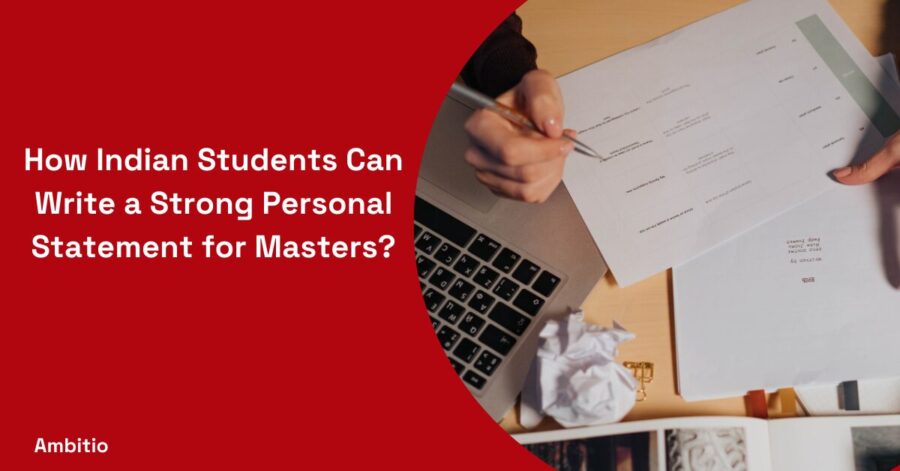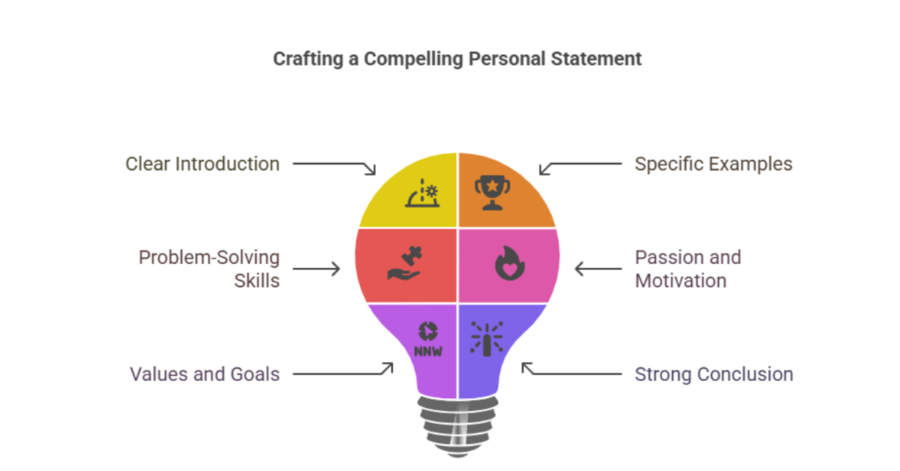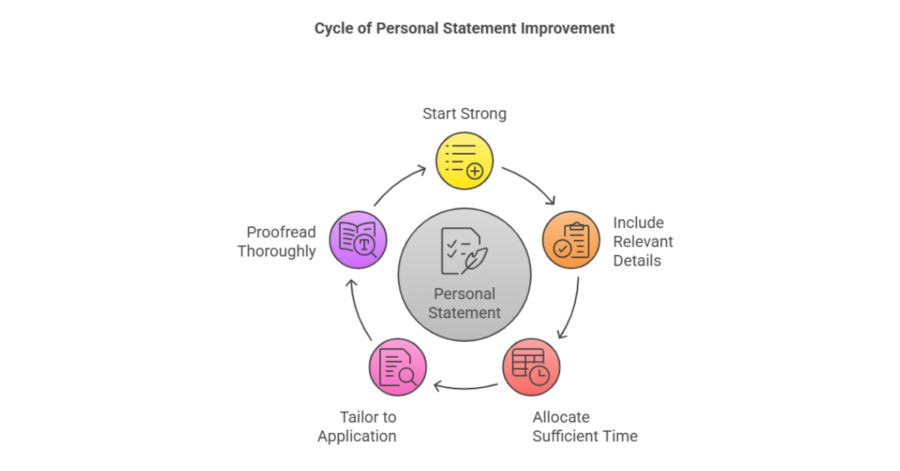9 May 2025
5 minutes read
How Indian Students Can Write a Strong Personal Statement for Masters?

Key Takeaways:
- Personal statement for masters should showcase your academic achievements, career goals, and course fit to stand out in the competitive application process.
- Tailor each personal statement to the specific program, focusing on your unique motivations and relevant experiences.
- With 75,000 Indian students applying abroad yearly, take your time to craft a clear, compelling statement that demonstrates your suitability.
Were you aware that over 75,000 students from India apply to postgraduate programs globally each year, but many students are turned down because they wrote shoddy personal statements? It’s not about grades: It’s about the writing.
In fact, most personal statements these students write are littered with clichés, irrelevant work experience, or generic phrases like, “I have always wanted to study this course,” which instantly bore the admissions team. A strong personal statement for masters is not about fancy words; it is about clarity, relevance, and evidence. Let’s make yours truly distinctive.
Understand What a Personal Statement for Postgraduate Really Means
A personal statement for masters degrees is a written document that lets tutors learn about your studies, relevant experience, and motivations for applying. It is the most significant part of your application form and it is not an autobiographical note. Indian students must use the first paragraph to demonstrate their academic interests, future career trajectory, and the appropriateness of the course.

The same personal statement shouldn’t be used for every application, there should be a difference in each one. Working out your personal statement in advance allows you to have time to provide evidence and fulfill course requirements. It is important to demonstrate your willingness to follow steps to stand out.
Why Indian Students Need a Tailored Approach for University Admission
We know that students from India use general personal statement examples or use their personal statement for every application which takes away the power of the personal statements. A personal statement for masters should show an understanding of the course, relevant work experience, and your ability to communicate in writing.
The first paragraph must articulate your interest in studying that course, how your undergraduate degree and academic background are aligned and ultimately what led you to make the application. Developing each piece of writing will enable you to show your character, your suitability and your aspirations to the admissions committee clearly.
Key Elements to Include in Your MSc Application Personal Statement
The opening paragraph of your personal statement for masters is your chance to grab attention and show exactly why you’re applying. Indian students often overlook the importance of aligning academic and employment background with the chosen course.

Writing a personal statement for university application is not just about sharing autobiographical information; it’s about showing the admissions committee that you understand the course, meet its requirements, and are prepared for the rigour of a graduate degree. Here’s what to include in your personal statement:
Clear Academic Background & Interest in the Subject
Explain how your undergraduate level studies led you to apply for this course. Mention key academic achievements that align with your chosen course.
Strong Reasons for Applying
Don’t just say you want to study the course, explain why. Mention current interests, career aspirations, and how this degree fits into your long-term plans.
Research the Course Thoroughly
Refer to specific course pages, modules, or faculty that excite you. This shows you’ve done your homework and proves the course is right for you.
Relevant Skills and Work Experience
Include relevant skills, work placements, or employment that show your suitability. Tie them back to course requirements to make your application stand.
Evidence of Soft Skills
Demonstrate time management, written communication skills, and planning your personal statement thoughtfully, these are crucial for grad school success.
Tailored Content for Each Application
Never use the same statement for all applications. A good personal statement is succinct, focused, and tailored to each institution’s expectations.
Connection to Future Goals
Explain how the graduate degree supports your future career and personal goals. Highlight any research interests or particular issue you’d like to explore.
How to Start a Personal Statement for Masters
The opening lines of your personal statement are crucial in a postgraduate application. This is your opportunity to capture attention by clearly stating why you want to pursue the course. Avoid vague statements, be specific, direct, and show a clear understanding of the subject and its relevance to your goals.
A good personal statement is a piece of writing that sets the tone for the rest of your course application, so make it impactful, purposeful, and aligned with the graduate school admissions process. This is how to start a personal statement.
5 Expert Tips to Make Your Personal Statement Stand Out
For Indian students, writing personal statements can feel like just another task in the long application process. But the truth is, your personal statement for masters is your opportunity to speak directly to the admissions team, beyond scores and transcripts.

A well-crafted, effective personal statement can tip the scales in your favour. You just need to know how to get it right from the start.
1. Start Strong with a Clear Heading and Key Points
Use the heading to introduce your academic focus, then follow with a few strong lines that clearly explain why you want to pursue the course. This grabs attention instantly.
2. Include Only What Adds Value
Don’t overload your statement of purpose with every achievement. Focus on what you must include in your personal statement, relevant skills, academic goals, and course alignment.
3. Give Yourself Plenty of Time
Effective personal writing isn’t rushed. Plan well ahead, so the writing that you submit feels polished, not forced. Time helps avoid clichés and repetition.
4. Tailor It to Every Application
Each statement will need to reflect specific program strengths. Research and check the application and course structure before writing your personal statement.
5. Proofread Like a Pro
Always read your personal statement aloud. This helps catch awkward phrasing and ensures your writing has a natural flow. It also shows you have a clear understanding of how to communicate effectively at the graduate level.
10 Top Universities to Study Masters Abroad
Pursuing a master’s degree abroad offers Indian students access to world-class education, diverse cultural experiences, and enhanced career prospects. However, the costs and requirements vary significantly across countries and institutions.
Below is a comparative overview of top universities for master’s studies abroad, highlighting average tuition fees, potential average salaries post-graduation, and commonly required entrance exams.
| University | Average Tuition Fees (per year) | Average Starting Salary (per year) | Common Entrance Exams |
|---|---|---|---|
| Massachusetts Institute of Technology (MIT) | $50,000 – $55,000 | $80,000 – $100,000 | GRE, TOEFL/IELTS |
| Stanford University | $50,000 – $55,000 | $80,000 – $100,000 | GRE, TOEFL/IELTS |
| University of Oxford | £24,000 – £35,000 | £35,000 – £45,000 | GRE (some programs), IELTS |
| University of Cambridge | £24,000 – £35,000 | £35,000 – £45,000 | GRE (some programs), IELTS |
| ETH Zurich | CHF 1,500 – CHF 2,000 | CHF 80,000 – CHF 100,000 | GRE, TOEFL/IELTS |
| University of Toronto | CAD 20,000 – CAD 40,000 | CAD 60,000 – CAD 80,000 | GRE, TOEFL/IELTS |
| University of Melbourne | AUD 30,000 – AUD 45,000 | AUD 70,000 – AUD 90,000 | GRE, TOEFL/IELTS |
| Technical University of Munich (TUM) | €0 – €3,000 | €50,000 – €70,000 | GRE, TOEFL/IELTS |
| National University of Singapore (NUS) | SGD 25,000 – SGD 35,000 | SGD 60,000 – SGD 80,000 | GRE, TOEFL/IELTS |
| University of Tokyo | ¥535,800 | ¥4,000,000 – ¥6,000,000 | GRE, TOEFL/IELTS |
Conclusion
Your personal statement is your opportunity to make a lasting impression on admissions committees. For Indian students, it’s crucial to include elements like academic achievements, career aspirations, and reasons for choosing the program.
A well-crafted statement can set you apart from other applicants. If you’re looking for expert guidance in writing a standout personal statement, Ambitio is here to help!
We specialize in profile building and can work with you to craft a statement that truly reflects your potential. Ready to take the next step in your study abroad journey? Let’s build your dream profile today!
FAQs
What is a personal statement for masters?
A personal statement for masters is a written essay that explains your motivation, achievements, and suitability for the chosen program.
How long should my personal statement for masters be?
Most universities recommend your personal statement for masters be between 250 and 500 words.
What should I include in my personal statement for masters?
Include your motivation for the course, relevant skills and experiences, academic achievements, and future career goals.
How should I structure my personal statement for masters?
Use a clear structure with an engaging introduction, a focused body, and a strong conclusion summarizing your aspirations.
Can I use the same personal statement for masters for different courses?
No, you should tailor each personal statement for masters to the specific course and university.
Should I mention weaknesses or gaps in my personal statement for masters?
Yes, address any weaknesses honestly and explain how you have learned from or overcome them.
How can I make my personal statement for masters stand out?
Showcase unique experiences, be specific about your goals, and demonstrate genuine passion for the program.

You can study at top universities worldwide!
Get expert tips and tricks to get into top universities with a free expert session.
Book Your Free 30-Minute Session Now! Book a call now




























